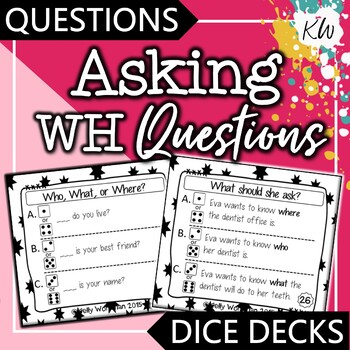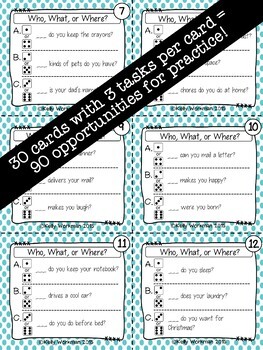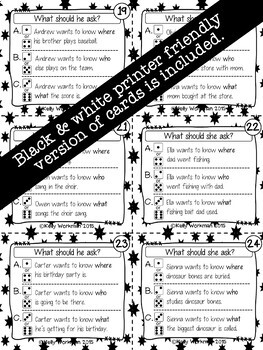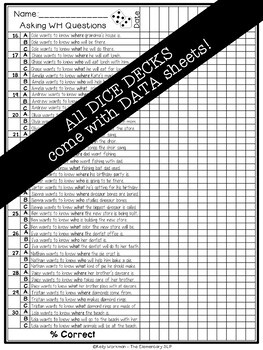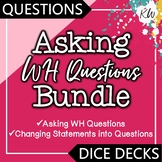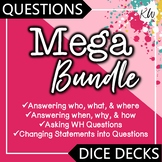Asking Questions: Speech Therapy Asking WH Questions Game
- PDF
What educators are saying
Also included in
- Asking Questions (speech therapy or regular/ special education) - teach and practice! Give your students tons of practice learning the skill of asking questions with these interactive task cards! Save over 20% by purchasing this bundle!This bundle includes 2 DICE DECKS:Asking WH QuestionsAsking QuePrice $8.00Original Price $10.00Save $2.00
- Speech Therapy WH Questions DICE DECKS MEGA BUNDLE! Use these WH Questions Task Cards to give your students lots of practice learning how to ask and answer questions! In this mega bundle you will receive all 4 WH Questions DICE DECKS for 20% off! The following products are included:· Answering WH QuPrice $16.00Original Price $20.00Save $4.00
- ♥ DICE DECKS series GROWING BUNDLE! ♥ In this growing bundle you will receive ALL 40 current DICE DECKS for 30% off! Here’s the BEST part – by purchasing this growing bundle now, you will receive ALL future DICE DECKS for FREE! That’s right – FREE! Whenever a new DICE DECKS set is uploaded, you wilPrice $133.00Original Price $190.00Save $57.00
Description
Asking WH Questions (speech therapy, special education, or regular education) - teach and practice with this WH questions activity!
Use this WH questions game to help your students learn how to ask questions with who, what, and where question forms.
· Choose the correct question word – who, what, or where: 15 interactive task cards x 3 tasks each = 45 tasks
· What should he/she ask? 15 interactive task cards x 3 tasks each = 45 tasks
30 task cards x 3 tasks each = 90 total opportunities to practice asking questions!
WHAT’S INCLUDED?
· Description and Suggestions
· 30 interactive task cards x 3 opportunities each = 90 opportunities to practice this skill!
· Black and white {printer friendly} version of task cards
· Data Sheets
· Student Response Sheets
· Answer Key
Prefer a NO PRINT (digital) version of this resource? Click here.
How do DICE DECKS work?
DICE DECKS are highly engaging and make learning fun! Have a student roll a die. Then, have them look on their DICE DECKS card for the corresponding number. If the die lands on a 1 or 4, task A will be completed. If it lands on a 2 or 5, task B will be completed. If it lands on a 3 or 6, task C will be completed. So simple, yet SO engaging!
General DICE DECKS Description
DICE DECKS are great for regular education classrooms as well as specialized instruction such as speech therapy (language therapy), special education, intervention specialists, ESL / ELL learners, etc. They work wonderfully for individualized instruction, partner work, literacy centers, stations, small group instruction, and for engaging the whole class by rolling the die under a smartboard camera or with a game such as scoot! Most decks are tied to one or more of the Common Core State Standards (CCSS) for English Language Arts and Literacy (ELA). And, most decks come with data sheets! Many have also used these decks for practice of specific skills learned, progress monitoring, and as review for standardized test assessments.
*******************************
© The Elementary SLP
This product is intended for personal use in one classroom only. For use in multiple classrooms, please purchase additional licenses.

